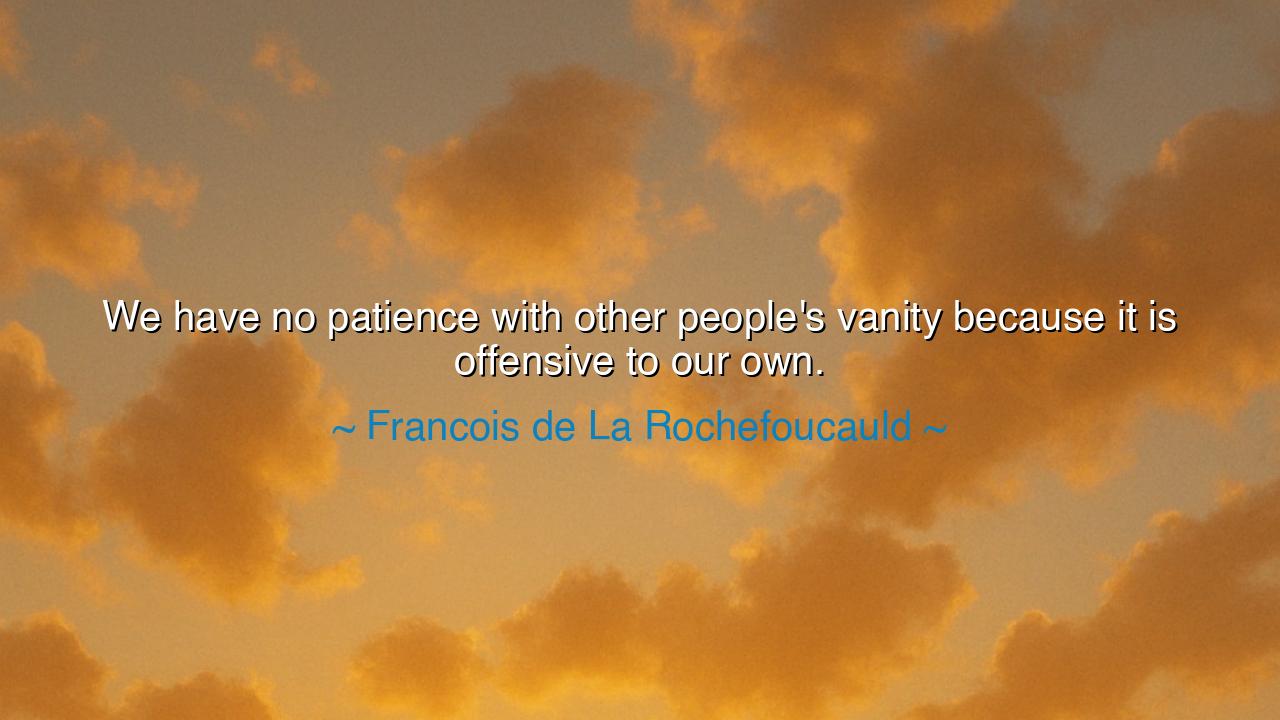
We have no patience with other people's vanity because it is






The French nobleman and moralist François de La Rochefoucauld, famed for his sharp maxims that pierced the illusions of human pride, once declared: “We have no patience with other people's vanity because it is offensive to our own.” In this simple yet devastating line, he uncovers a paradox of the human heart: we despise in others the very flaw that dwells within ourselves. It is not merely the vanity of another that disturbs us, but the mirror it holds up to our own secret hunger for recognition.
To lack patience with another’s vanity is to reveal that our own pride has been wounded. We see another basking in praise, boasting of success, or displaying accomplishments, and it unsettles us not because the act itself is unbearable, but because it competes with our own unspoken desire for esteem. La Rochefoucauld, who lived amidst the intrigues of the French court, knew well the games of flattery, rivalry, and pretense. He saw that behind every mask of indignation was often a deeper jealousy. Thus his maxim exposes not others, but ourselves.
Consider the story of Julius Caesar and Pompey the Great, whose rivalry shook the Roman Republic. Pompey could not endure Caesar’s rising glory, and Caesar could not bear to share renown with Pompey. Each man’s vanity magnified the other’s, and their impatience with one another’s pride led to civil war. It was not only politics that drove them, but the offense of seeing the other exalted. Rome paid the price for two men who could not bear the mirror of their own ambition reflected in their rival.
Even in ordinary life, this truth endures. Among friends, one may boast of a new achievement, a promotion, or wealth, and suddenly the others grow restless. They cloak their discomfort in scorn: “He is vain, she is proud.” Yet beneath the words lies a hidden confession — that their own vanity has been stirred, their own longing for honor wounded. La Rochefoucauld calls us to recognize this hypocrisy: that our anger at another’s pride is often born of our own pride.
The deeper wisdom here is that true freedom comes not from despising the vanity of others, but from conquering our own. When a man is secure in his worth, another’s boasting cannot disturb him. When a woman rests in her own quiet dignity, another’s pride cannot shake her. But when our hearts remain chained by the craving for recognition, every display of vanity by another becomes salt in our wounds. Thus, La Rochefoucauld urges us not to condemn others too quickly, but to turn inward and examine the hidden roots of our impatience.
The lesson is clear: do not let vanity rule you, and you will no longer be troubled by it in others. Practice humility, not as weakness, but as strength — the strength to stand unshaken while others clamor for praise. Cultivate patience, not as passive endurance, but as the calm certainty that your worth is not measured by comparison. By mastering your own pride, you rob the vanity of others of its power to offend.
Therefore, O seekers of wisdom, hear the counsel of La Rochefoucauld. When you feel your spirit rising in anger at the vanity of another, pause and ask: Is it truly their pride that offends me, or my own? Turn the gaze inward, conquer the restless need for glory, and you shall walk among men and women with serenity. For the one who has mastered himself has patience with all, and the one who has patience with all walks in the freedom of the ancients, unshaken by the vanity of the world.






AAdministratorAdministrator
Welcome, honored guests. Please leave a comment, we will respond soon